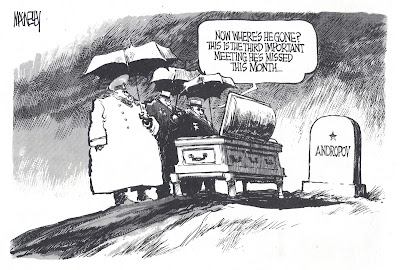JEFF MACNELLY
Jeff MacNelly never went to art school or graduated from college, but his brain was the prototype for 3D supercomputer graphics software-- he had the uncanny ability to visualize an object and rotate it in his head on all three axes, then scale, translate and project it-- all before breakfast.
MacNelly rarely drew one of his political cartoons straight on-- instead, he effortlessly played with the vantage point, ratcheting it up or down a few degrees to make the picture more dynamic:

Note how the low vantage point completely transforms what would otherwise be a fairly conventional scene.


MacNelly punctuates the receding plane of the bar with well placed figures.

Here, he convincingly intersects the receding plane of the fence with the right angle of the jet and the acute angle of that sagging truck.
His angles allowed him to go wild when foreshortening the ground-- a side benefit he obviously enjoyed...


MacNelly won his first pulitzer prize by the time he was 25. He told friends he hoped that by hanging his pulitzer high enough on the wall, he might fool people into thinking it was a college degree. He won two more pulitzers by the age of 38.

A highly prolific artist, MacNelly used to claim that on days when he felt he had done a bad job with his cartoon, he would sign his name to look like "Oliphant."

MacNelly was a natural; he intuitively understood many of the things he might have learned in art school; for example the fact that the part of the picture that attracts the most attention is the part that appears to be out of place (here, the small dark figure contrasted against the white half of this picture.)

MacNelly's gift for visualizing an image and rotating it on an axis was not limited to the drawing. One of the things that made him the preeminent editorial cartoonist was that he could rotate ideas as well, looking at subject matter from a variety of perspectives in order to come up with great concepts.


MacNelly rarely drew one of his political cartoons straight on-- instead, he effortlessly played with the vantage point, ratcheting it up or down a few degrees to make the picture more dynamic:

Note how the low vantage point completely transforms what would otherwise be a fairly conventional scene.


MacNelly punctuates the receding plane of the bar with well placed figures.

Here, he convincingly intersects the receding plane of the fence with the right angle of the jet and the acute angle of that sagging truck.
His angles allowed him to go wild when foreshortening the ground-- a side benefit he obviously enjoyed...


MacNelly won his first pulitzer prize by the time he was 25. He told friends he hoped that by hanging his pulitzer high enough on the wall, he might fool people into thinking it was a college degree. He won two more pulitzers by the age of 38.

A highly prolific artist, MacNelly used to claim that on days when he felt he had done a bad job with his cartoon, he would sign his name to look like "Oliphant."

MacNelly was a natural; he intuitively understood many of the things he might have learned in art school; for example the fact that the part of the picture that attracts the most attention is the part that appears to be out of place (here, the small dark figure contrasted against the white half of this picture.)

MacNelly's gift for visualizing an image and rotating it on an axis was not limited to the drawing. One of the things that made him the preeminent editorial cartoonist was that he could rotate ideas as well, looking at subject matter from a variety of perspectives in order to come up with great concepts.




